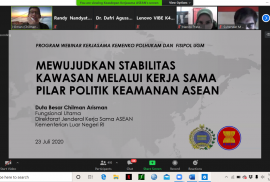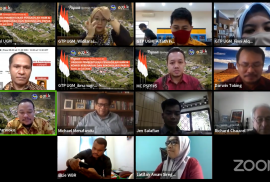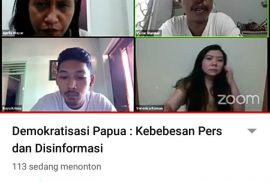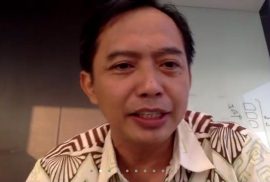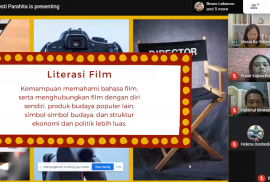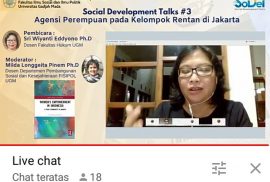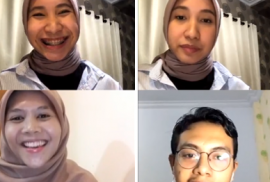Yogyakarta, July 23rd 2020 – During this pandemic, ASEAN had a lot of contacts with partner countries such as South Korea, China and Japan. Besides that, ASEAN must anticipated various threats and challenges in this time. ASEAN Studies Center (ASC) Fisipol UGM discussed this theme on its webinar called ‘ASEAN Talk: Anticipated Traditional and Non-traditional Security Threats in the COVID-19 Pandemic Era – the Challenges of Indonesia and ASEAN’. This webinar was held on Zoom and YouTube on Thursday (23/7) from 10.00 a.m. In this webinar that joined by, at least, 500 people, ASC presented Coordinating Ministry for Political, Legal, and Security Affairs of Republic of Indonesia.
News
Yogyakarta, July 23rd – Welcoming the arrival of the electoral party at the elections which will be held in December this year, Department of Politics and Government Fisipol UGM held a virtual discussion session called Candidation Process in 2020 Local Elections: A Dark Room Full of Mystery and presented Djarot Saiful Hidayat (Chairperson of the Ideology and Cadre Development of Indonesian Democratic Party of Struggle), Hasyim Asy’ari (Member of General Elections Commission of the Republic of Indonesia), and Arya Budi (Lecturer of Department of Politics and Government Fisipol UGM) as the three main speakers in this discussion. Moderated by Mada Sukmadjati, lecturer of Department of Politics and Government Fisipol UGM, the discussion lasted comprehensively because the speakers not only gave lectures about theories, but also gave an empirical illustration, one of them was Djarot Saiful Hidayat that begun the discussion by explaining about the context of the dynamics of local elections candidation process which have done by Indonesian Democratic Party of Struggle (PDI-P).
Yogyakarta, July 20th 2020—The 5th Papua Strategic Policy Forum event is back with a discussion titled “The Urgency of Creating a Human Rights Court & Truth and Reconciliation Commission for Papua” which was held by UGM Papua Taskforce and The Center for Capacity and Cooperation Building Fisipol UGM. The event was held online through Zoom and live streamed on Youtube. The discussion started with a presentation by Beka Ulung Hapsara, an Education and Counseling Commissioner in the National Committee of Human Rights. He said that the issue of papua is very complex, not just about the inequality but also the law enforcement in Papua. He said that there are only four human rights violations in Papua that are being investigated. Therefore, the Papua Truth and Reconciliation Commission (KKR) needs to investigate now. In the future, KKR will also create a clarification of Papua’s history, establish reconciliation steps, and ensure that there will be no more human rights violations in Papua in the future.
Yogyakarta, July 20th 2020—Gadjah Mada University’s Center for Digital Society held the 27th digital discussion. In this episode, CfDS invited Izzati Dwifitriani, a content writer at RWE Digital Agency. The event titled “Content writing: from Hobby to Profession” was held through a Whatsapp Group. As usual, half an hour before the event started, the moderator — Made Agus Bayu Sudharma, CfDS’s Event Assistant — reminded the attendant that the event will start soon. Right at 7 pm, the moderator opened the discussion by introducing himself and telling the attendant the rules. The moderator also gave a chance for the speaker to introduce herself.
Yogyakarta, 18 July 2020—Korps Mahasiswa Politik Pemerintahan/KOMAP and Dema Fisipol UGM organized virtual discussion Warung Politik under the theme of Freedom of Press and Disinformation in Papua. The discussion was held through Zoom and aired live via DEMA Fisipol UGM’s Youtube channel. Well-known speakers were invited, namely Veronika Koman (working as a human rights lawyer), Victor Mambor (working as a senior journalist focusing on issues of Papua), and Aprilia Wayar (as a writer and member of AJI Yogyakarta). Bayu Krisna, a student of Government and Political Sciences UGM, acted as the moderator.
Yogyakarta, July 17th 2020 – Department of Communication Science Fisipol UGM held another ‘Ngopi’ discussion. This fifth series of Ngopi called ‘The People’s Opinions and Crisis Communication of the Corona Pandemic’. This discussion presented three speakers, they were a researcher of Indonesia Indicator, Nur Imroatus S. Then, an advisor of International Media Support, Denmark, R. Kristiwan. And the last was a lecturer of Department of Communication Science, Wisnu Martha Adiputra. The moderator of this event was a lecturer from Department of Communication Science of Fisipol UGM, Wisnu Prasetyo Utomo.Nur began the discussion by showing the Indonesia Indicator observation result towards the news in the online medias during the period from March, 23rd to July, 2nd 2020. She found at least 70 steps of the central government which were reported by the Indonesian online medias. This report, according to Nur, shown the liveliness of the government to talked about their steps to the media. But, the informations about COVID-19 from the government seemed unplanned. “Public communication between central government and local government was often out of sync,” said this woman who was familiarly called Iím.
While explaining the importance of having film literacy, Gilang also mentioned at least four elements of the films that should we know. First, there were dramatic and cinematic structures in a film as the efforts of the producer to make the film more alive and more realistic. Second, relation of the film and audience could pictured how the dramatic and teathrical effects of the film could affect the audience. Third, contexts and consequences which were positioned to explain why this film was produced, distributed, showed, also the effects to the society. Creation became the last element of the film literacy which contained about the process of creative powers were distributed into the production of a film.
Before talking about the topics in details, Jasmine began her explanation with the general description of the youth activism in the digital era. The prank against Donald Trump case happened at the same time with Donald Trump’s first campaign after his temporary hiatus because of COVID-19. The reservation of this campaign had reached one million tickets. But, on the D-day, just 6.200 people came to the campaign location. The big gap was due to many ‘fake reservations’ invitation.
Started from TikTok, especially the Alt TikTok sub-genre, this invitations were shared on the Twitter and caused the increasing amount of the mass. The mass movement in the social media also happened with the Black Lives Matter campaign by the K-Popers. They spammed videos on the hashtag which against the Black Lives Matter, temporarily damaged the Dallas Police’s application because of those spammed videos, and fundraised for the BLM campaign that reached millions of dollars.
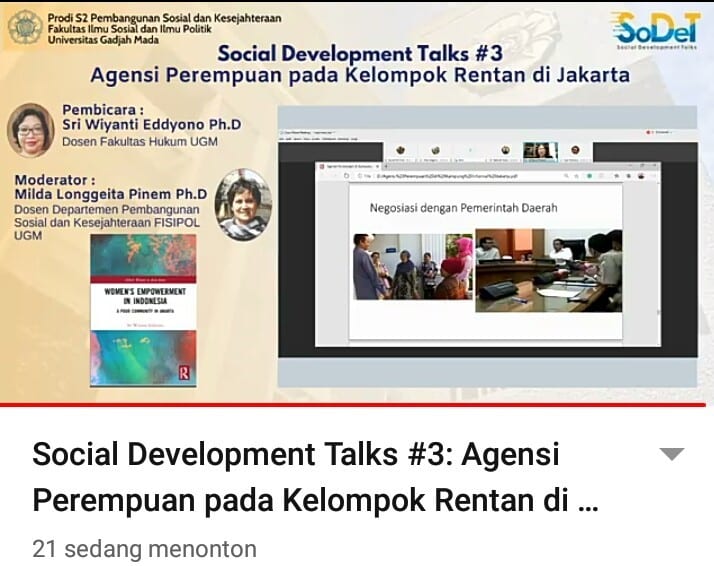
In this occasion, the discussion topic was referred to a book with the title Women’s Empowerment in Indonesia which was written by the speaker. In that book there were seven chapters and for this discussion it focused on the topic of women’s agency. The book was a research publication which was done by the speaker in an informal village in Jakarta, known as Kampung Rawa. In her research, the speaker tried to connected the dots between the concept of the importance of women’s agency in the women’s empowerment.
The LPDP scholarship varies. There is the regular scholarship, scholarship for children who went to religious schools, athletes, dissertations, doctors, and many more. Sekar explained that the LPDP policy now and in 2016 is slightly different in terms of the application to the selection process. Before, we were able to choose one university of our choice, but now that choice is narrowed down to three choices in the list. The selection process also used to not be done through the computer.
Based on Sekar’s experience, the difference between the University of Birmingham and Gadjah Mada University is apparent in it’s academic area. In the University of Birmingham, reading a literature is mandatory before we go to class, unlike many universities in Indonesia where we are free to read or not to read. “The difference that is most apparent is in the academic area.

